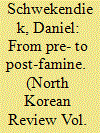|
|
|
Sort Order |
|
|
|
Items / Page
|
|
|
|
|
|
|
| Srl | Item |
| 1 |
ID:
124585


|
|
|
|
|
| Publication |
2013.
|
| Summary/Abstract |
Purpose-In the 1990s, North Korea experienced a national crisis that evolved into a famine. This paper explores the trends in underweight among preschool children measured from the pre- to the post-famine period.
Design-This research employs nutrition surveys carried out in North Korea in 1987, 1997, 1998, 2000, 2002, 2004, 2009 and 2012.
Findings-This paper shows that the country now has reached a pre-crisis level, indicating that children today are faring as well as they were during the Cold War. However, underweight rates are 24 times higher in North Korea compared to South Korea. More important, the UN targets an underweight rate of 9 percent in East Asia, but the rate is as high as 15 percent in North Korea, implying that further efforts are needed.
Originality-This paper provides rare evidence on the long-term trend in underweight among North Korean children. This is also the first paper that compares underweight rates of contemporary North Korean children with their South Korean peers.
|
|
|
|
|
|
|
|
|
|
|
|
|
|
|
|
| 2 |
ID:
144999


|
|
|
|
|
| Summary/Abstract |
Both Germany and Korea have recently attempted to improve their positions in worldwide university rankings, introducing major reforms with the aim of funding research clusters and groups. Additionally, Germany has opted to introduce elite universities and junior professorships. The THE-QS World University Rankings, a compilation published from 2004 to 2009, provides some evidence that the mean ranking of German universities did not improve during the observed period. This paper tentatively suggests that this may be due to the fact that Germany is lacking a publish-or-perish promotion system spanning the period from graduation to tenure. In contrast, Korea has implemented a number of “big-push” reforms such as mandatory English curricula, foreign professorships, and foreign-student quotas, all of which have apparently resulted in a massive “brain gain.” In addition, the Korean government’s efforts to make publications in acknowledged journals compulsory have dramatically improved Korea’s research output and apparently contributed to its sharp rise in the THE-QS World University Rankings. Though Korean universities surpassed German ones on average in the short run, the effects of the German academic reforms await further ranking evidence in the long run. Further drawbacks and advantages of the system in Korea and Germany are critically discussed.
|
|
|
|
|
|
|
|
|
|
|
|
|
|
|
|
|
|
|
|
|